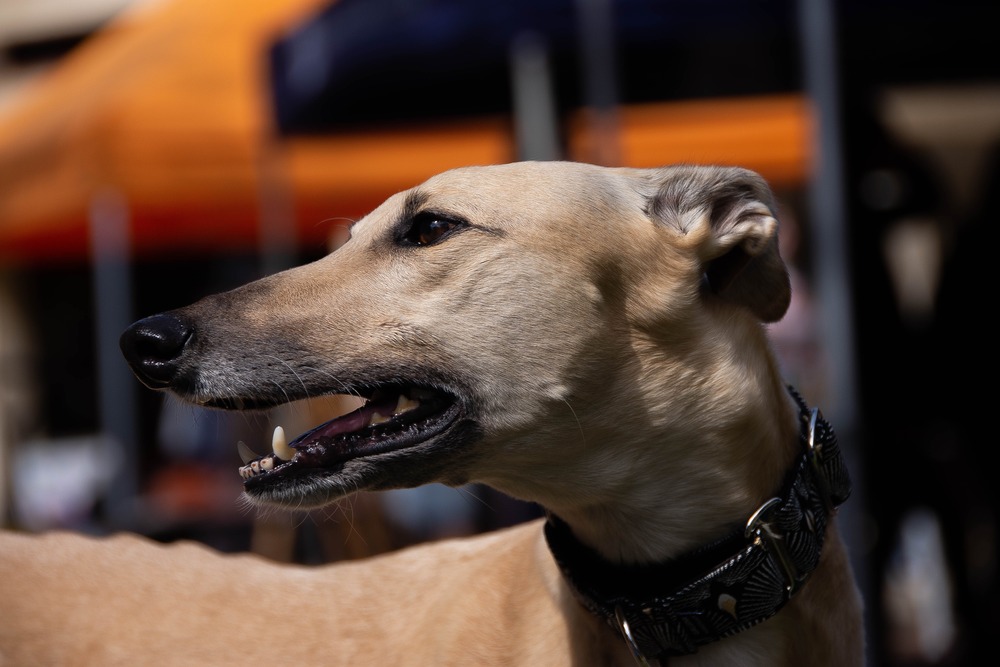Greyhounds require essential care to ensure their health and well-being. In this article, we will cover the basics of greyhound care, such as feeding, exercise, grooming, and regular vet check-ups. We will also delve into common health issues that greyhounds may encounter, including dental care, parasite prevention, allergies, and joint health.
The Basics of Greyhound Care
Greyhounds require specific care and attention to ensure their overall well-being. Understanding the basics of greyhound care is essential for providing a healthy and happy life for your beloved pet. This section covers key aspects of greyhound care, including feeding, exercise, grooming, and regular veterinary check-ups.
Feeding Your Greyhound
Proper nutrition is vital for greyhounds to maintain their optimal health. High-quality commercial dog food formulated specifically for large breeds is recommended.
A good diet should include some fresh vegetables (such as carrots, squash or spinach), lean meats and some fruits.
Feed your greyhound measured portions based on their age, size, and energy level. Avoid overfeeding to prevent obesity, which can lead to various health issues.
Avoid your greyhound’s stomach problems by following these recommendations:
- Feed in two shifts per day.
- Always provide fresh, clean water.
- Keep the food and water dish elevated so that the dog does not have to bend his head to eat.
- Do not offer food or very cold water immediately after exercise.
Exercise and Mental Stimulation

Greyhounds are active dogs that require regular exercise to stay physically fit and mentally stimulated.
Aim for daily walks or runs in a secure, fenced area. Try to give your greyhound at least two walks a day. Each walk should last about half an hour.
Engage them in structured play sessions and provide puzzle toys or interactive games to keep their minds sharp.
Grooming and Hygiene
Greyhounds are naturally clean and odorless dogs. They have short, smooth coats and generally require minimal grooming. Brushing once a week is enough to keep their coat silky, shiny and free of loose hair. And as for bathing, it is advisable to do it every 3 months. You can do it more often if he gets dirty on a walk or if there is a bad smell. and free of loose hair.
If you have a long-haired greyhound, such as an Afghan or a Borzoi, it is recommended that you brush more frequently and, because they are generally very clean dogs, that you bathe them once a month.
Trim their nails regularly, clean their ears, and brush their teeth to maintain their overall hygiene.
Essential Vaccines for Your Greyhound
The C5 vaccine provides protection against common and serious diseases:
- Distemper Virus
- Canine Adenovirus
- Canine Parvovirus
- Parainfluenza virus (PI)
- Bordetella bronchiseptica (BB)
Rabies virus: Because it is an endemic virus, its placement varies by country and geographic area.
Regular Veterinary Check-ups
Routine veterinary check-ups are crucial for greyhounds to detect and prevent potential health issues. Schedule regular visits with a trusted veterinarian to ensure vaccinations are up to date, monitor overall health, and address any concerns promptly. These check-ups also allow for preventive measures against common greyhound health problems.
Common Health Issues in Greyhounds
Greyhounds, like any other breed, can experience certain health issues that require special attention and care. Understanding these common health issues will help you proactively address them and ensure the well-being of your greyhound.

Dental Care for Your Greyhound
Dogs, like people, can develop several oral problems. When a dog eats, food particles break down and form a yellowish-brown layer called tartar. This bacterial coating can cause gum infections, tooth loss, bad breath and a lot of pain. But it doesn’t stop there, as the infection can spread by entering the bloodstream and cause cardiovascular, digestive and kidney disease.
Proper dental care is critical for greyhounds because, as explained above, dental problems can not only cause discomfort, but can also lead to more serious health problems.
Regular teeth brushing and annual professional dental cleanings are recommended to maintain your greyhound’s oral health.
Parasite Prevention: Fleas, Ticks and Internal Deworming
Internal Deworming
Internal parasites are largely responsible for the digestive problems and malnutrition your greyhound may suffer from. This is easily prevented by simply deworming your adult dog every 3 months. Remember that this is different for puppies and should be done on a more regular basis.
Consult your veterinarian about the frequency and dosage of medication your greyhound needs.
External Deworming
Preventing flea and tick infestations is essential to your greyhound’s well-being. Use veterinarian-approved flea and tick prevention products and check your dog regularly for signs of infestation. Keep in mind that there are formulations available by pipette for manual application or by deworming collar. If you find any parasites on your greyhound, treat them immediately.
Allergies and Skin Conditions
Greyhounds can develop allergies and various skin conditions. It’s important to identify potential triggers and provide appropriate treatment. Consult with your veterinarian to determine the best course of action, including allergy testing, hypoallergenic diets, and medication if necessary.
Joint and Bone Health
Greyhounds are prone to joint and bone issues due to their slender physique and high-speed athletic nature. Preventive measures such as maintaining a healthy weight, providing joint supplements, and engaging in moderate exercise can help support their joint and bone health.
Great!, you now have all the information you need about the basic care of your greyhound.
Remember that your dog relies solely on you to treat his illnesses and provide him with a good quality of life, because that’s what they deserve!
